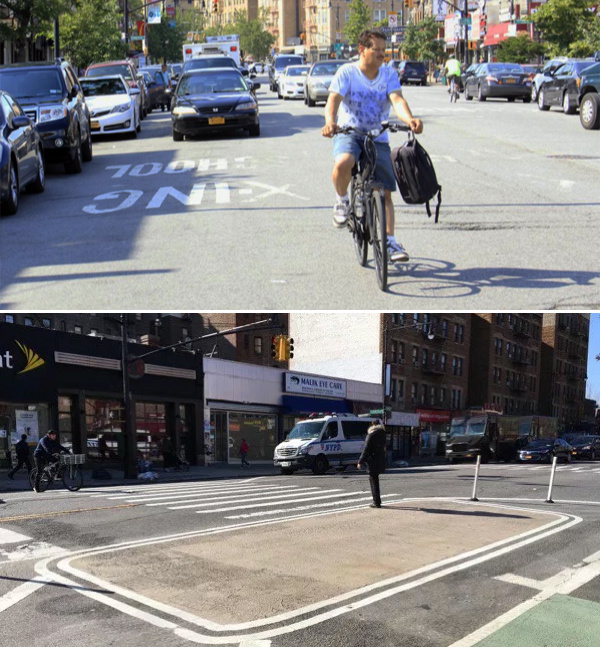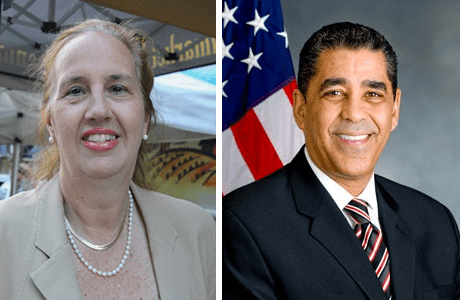Less than a year after endorsing long-awaited DOT bike and pedestrian safety measures for Dyckman Street in Inwood, Manhattan Community Board 12 is expected to vote next week on a resolution calling for their removal.
In an email blast to Upper Manhattan residents, Elizabeth Lorris Ritter, who chairs the board's parks committee, said the resolution would ask DOT to "consider a more thoughtful proposal for a crosstown bike path connector on another street."
"After several meetings and much public testimony," wrote Ritter, "it is clear that everyone agrees there’s a problem with the current configuration, even if there’s disagreement on how best to fix the problem(s)."
Ritter's assessment is misleading, to say the least.
Implemented last December, the Dyckman Street redesign -- which added bike lanes that separate cyclists from car traffic, shortened pedestrian crossing distances, and slowed driver turns -- didn't come from nowhere. If a citizen-generated project shaped by nine years of public feedback sessions and community board hearings isn't "thoughtful," what would qualify?
Nor by any stretch is there consensus that the new design is a failure.
It's too soon for DOT to have definitive Dyckman data, but in other locations protected bike lanes have improved safety across the board, particularly for pedestrians. Travel times on Dyckman have actually improved with the new design, according to DOT. Anecdotes concerning slowed emergency response times have not been supported by data, and last week an FDNY official attributed what problems there are to double-parked drivers.
And there's the rub. In reality, CB 12 is relitigating the Dyckman Street bike lanes because a handful of business owners are upset that drivers can't illegally double-park as easily as they used to.
Seeing an opportunity to curry favor with merchants who are anxious about Mayor de Blasio's plan to rezone the neighborhood, local Congressman Adriano Espaillat and Manhattan Borough President Gale Brewer amplified those complaints by conflating the Dyckman redesign and the rezoning as dual threats to commerce, contrary to before-and-after data showing no negative impact to businesses on commercial streets that have bike lanes.
.@RepEspaillat w @galeabrewer @jaimevargas57 #CirillMironta advocating for small businesses that may be hurt by bike lanes and a proposed rezoning of Dyckman and 207th st pic.twitter.com/UVQWBonhfh
— David Baily (@DavidBaily) April 7, 2018
Brewer and Espaillat have requested that DOT undo the Dyckman project and replace it with bike lanes on 204th Street, two blocks north. This would create a circuitous bike route no one would actually use, and it suggests pedestrian and cyclist safety should be an afterthought on a commercial street in a neighborhood where close to three-fourths of households are car-free. It also dismisses nearly a decade of advocacy on the part of locals who volunteered time and effort to see the project through.
More than 300 people were injured in crashes on Dyckman between 2009 and 2017, according to city data. There is no real-world justification to return the street to the dysfunctional mess it used to be. Which is why Espaillat and his protege Marisol Alcantara, the local State Senate rep, have resorted to framing Dyckman improvements as an attack on Inwood’s majority Dominican population -- none of whom, according to surrogates for Espaillat and Alcantara, have any use for a street that is safer to walk and bike on.

To reduce traffic and double-parking on Dyckman, DOT should raise meter rates when demand for curbside spaces is heaviest. Dyckman safety upgrades are not the problem, and erasing them will only make the street more dangerous for everyone who uses it.
DOT has signaled that the Dyckman bikeway is safe for the time being, but has not ruled out future changes. CB 12 needs to hear from the public -- again -- that there is no going back to the bad old days.
The board will meet next Tuesday, May 22, at 6:30 p.m. at NewYork-Presbyterian's Milstein Center, 173 Ft. Washington Avenue.






